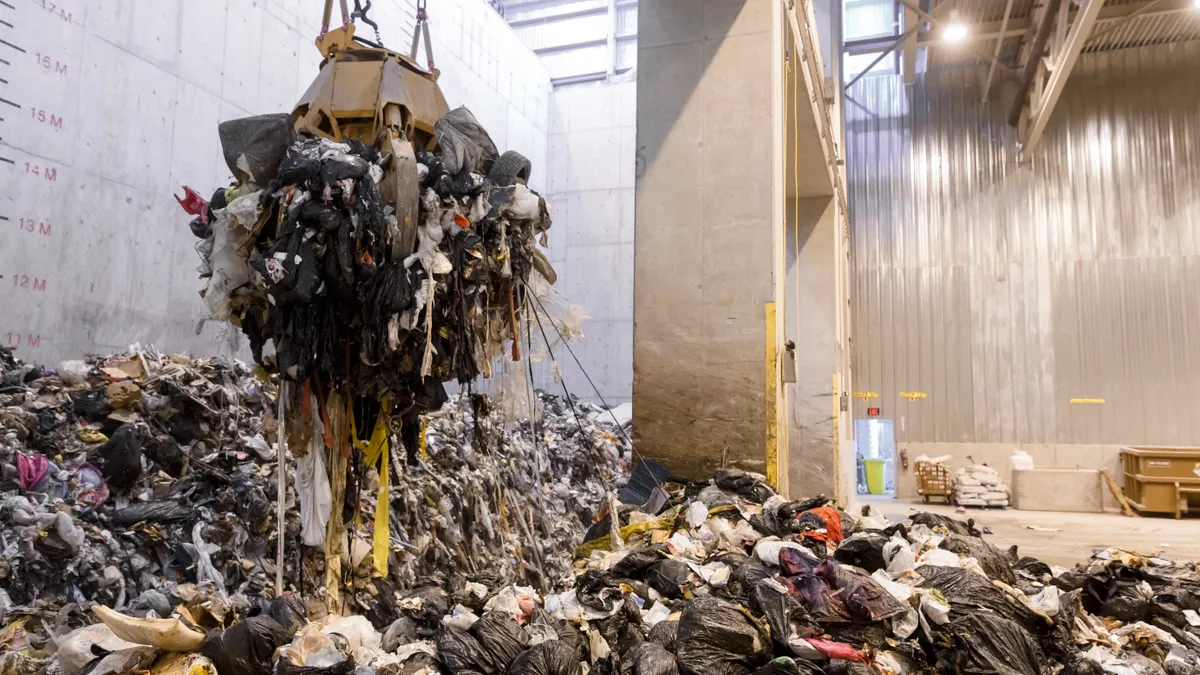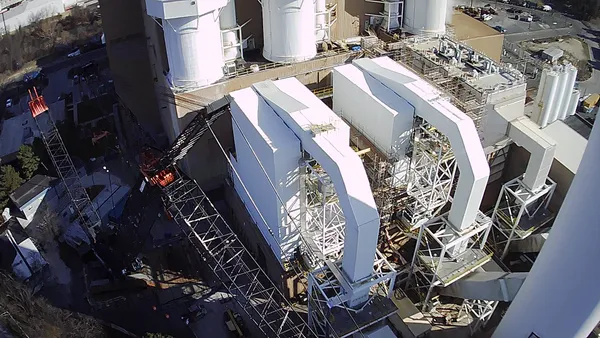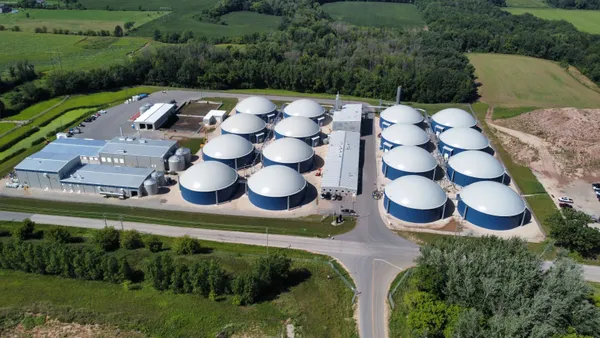Dive Brief:
- Country Holding Co. recently sued Reworld and its subsidiary for $450 million over a deal involving its purchase of a resource recovery facility in Wallingford, Connecticut.
- The case revolves around substantial demolition of the facility, which Country Holding agreed to purchase from Covanta, known as Reworld since April, in 2018. The company alleges Reworld rendered the facility unusable, despite assurances prior to the sale that it could be recommissioned, and “absconded with the scrap metal,” Country Holding’s lawyers say.
- Country Holding also alleges Reworld, with subcontractor Country Disposal, conspired to withhold the facility's operating permit and associated municipal disposal agreements. The new suit builds on prior litigation surrounding those agreements; in May, Reworld won a motion to dismiss previous claims Country Holding had made.
Dive Insight:
The lawsuit comes as Connecticut regulators have struggled to identify new disposal capacity. WTE sites in the area have been targeted for closure in recent years, including a refuse-derived fuel facility in Hartford run by the quasi-public Materials Innovation and Recovery Authority. Country Holding’s lawyers allege that Reworld is contributing to a “a well-known waste management crisis” through its actions.
“Everyone is harmed, our client, towns, and taxpayers, save [Reworld] who appears to be the beneficiary of ensuring Country Holding doesn’t operate,” Joseph Mazzarella, a partner at the law firm McCarter & English, which is representing Country Holding, said in an emailed statement.
Country Holding, along with other businesses affiliated with its president, Richard Antonucci Jr., has tried to position itself as a solutions provider to local jurisdictions in need of capacity. In a 2023 letter to regulators, Antonucci detailed plans to provide co-collection services, a processing facility for recyclables, anaerobic digestion and other services via the Wallingford site. He described the 9.8-acre site as well-positioned to serve several municipalities with a "huge tipping floor," roughly 85,000-square-foot building and more.
But Country Holding has fought Reworld for years over the viability of that facility, up to the most recent lawsuit, filed in Connecticut Superior Court on Aug. 30.
"This lawsuit is an attempt to relitigate, in a new court, a meritless case that was dismissed in its entirety earlier this year. Country Holdings currently owns the site," Nicolle Robles, director of communications at Reworld, said in an emailed statement.
The lawsuit contends that Reworld holds a "duopoly" on waste-to-energy facilities in Connecticut with WIN Waste Innovations via their respective affiliates. Reworld owns facilities in Bristol and Preston and WIN Waste owns WTE facilities in Bridgeport and Lisbon.
The Wallingford facility has had an operating permit from Connecticut's Department of Energy and Environmental Protection since 1986. Reworld’s subsidiary entered into disposal agreements with several municipalities in 2008. The agreements, which allowed Reworld or a subsidiary to haul waste to the Wallingford facility, were set to expire in 2020 with an option to renew.
Reworld ended operations of the RRF facility at the site in 2015 and reformatted its hauling agreements and permit to operate the Wallingford facility as a transfer station. At the time, the RRF facility remained dormant but largely intact, according to the lawsuit.
Country Holding offered to buy the facility, upgrade it and restart operations “towards the end of 2017,” according to the lawsuit. But Reworld allegedly declined to sign a purchase agreement until after an area underneath the incinerator room flooded with as much as a million gallons of water in January 2018. Country Holding alleges it was not informed of the flood at the time, despite Antonucci sending his father, Richard Antonucci Sr., to inspect the site. Antonucci Sr. was allegedly blocked from seeing the incineration room during his tour of the facility.
Country Holding was made aware of the flooding by Country Disposal — which Reworld contracted to run day-to-day operations at the facility — in June 2019. Reworld then promised Country Holding it would clean up the flooding, which gave the latter company the confidence to move forward with the sale, per the lawsuit.
The sale did not close until September 2019, as Reworld worked to transfer its disposal agreements and facility permit to Country Holding. The latter company agreed to pay $2 million for the facility and planned to keep Country Disposal on as the tenant-operator.
By 2020, a bond related to the facility’s closure had gone into default. After some back and forth with Country Holding, Reworld viewed the buyer's failure to replace the bond financing as a reason to reassign the disposal contracts back to itself. Soon after, the lawsuit alleges, the contract prices increased substantially, and Reworld negotiated to have municipalities reroute their waste to other facilities it owned.
Reworld also allegedly changed the scope of the closure plan at the Wallingford facility to completely demolish and remove equipment from the incinerator room, turbine room and other parts of the facility.
Finally, the lawsuit alleges that Reworld has worked to withhold the operating permit for the facility from Country Holding by first transferring the permit to Country Disposal, the tenant-operator, and then compelling Country Disposal through legal action to withhold the permit from Country Holding.
Earlier this year, in a successful motion to dismiss a previous iteration of this lawsuit, Covanta argued that it was within its right to reassign the disposal contracts when the bond went into default. It alleged that nothing in the purchase agreement prevented those actions. Per the motion, Antonucci Sr. refused to pay host fees and Country Holding attempted to raise tip fees and took other actions contrary to the agreed terms of the contract.
Reworld’s lawyers further successfully argued that its flood cleanup did not require it to remove all of the water in the facility, despite Country Holding’s claims to the contrary. They said that was due in part to the fact that Country agreed to acquire the property as-is and didn’t put explicit language in the purchase agreement requiring all of the water be discharged.
On the facility closure, Reworld’s lawyers also successfully argued that their obligations to regulators to safely close the RRF site superseded their obligations to maintain the site’s function as a waste-to-energy facility. A judge ruled in Reworld’s favor on May 28; Country Holding is appealing that ruling.
Though Country Holding had initially planned to allow Country Disposal to continue serving as tenant-operator at the facility, by 2023 the two parties’ “interests had diverged,” per the new lawsuit. Country Holding now owns the site.
According to its website, Country Disposal Services offers dumpster services to industrial, commercial and residential sites. It also offers septic services for commercial and residential customers.
Country Holding is now seeking $450 million in damages from Reworld, “or such amount to reconstruct and restore the Facility and its contents and infrastructure to the same condition its was at the time of the [sale agreement],” per the lawsuit. Its lawyers say the new case was necessary due to “additional claims ... that arose during the course of the first case and are continuing that must be heard.” Those include Reworld selling and receiving the proceeds from scrap metal from the site and blocking the transfer of the transfer station operating permit to Country Holding.















